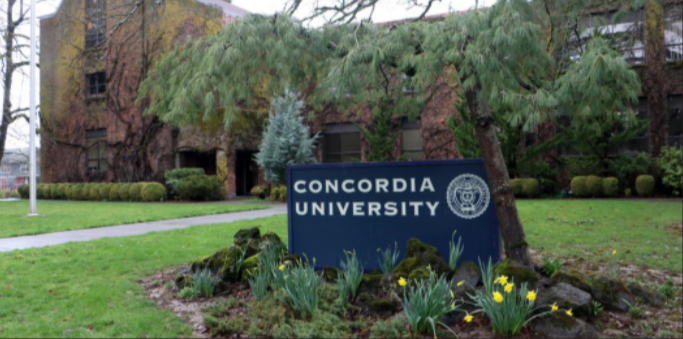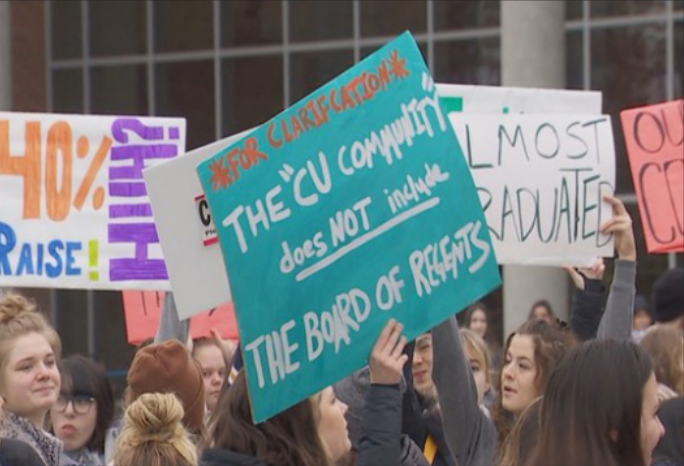
In November 2019, Concordia University, Portland (CUP) received $9.2 million from the Lutheran Church–Missouri Synod’s (LCMS) extension fund. Two months later, Interim President Tom Ries announced that CUP would close at the end of spring semester due to “financial difficulties.”
Like many small universities, CUP was fighting to fill its emptying pockets. With declining enrollment, unpaid construction debts and decreasing donations, it had a clear cash flow problem. But it wasn’t irreversible.
Overseen by the synod, CUP had created a financial recovery plan. The synod board, in its November 2019 meeting, said the school “anticipates a full recovery.” The board also passed a resolution demanding that the university address its resource center “issues.” If CUP didn’t get in line, the resolution stated, the synod “will not again approve any financial action for the benefit of the university.”
The “resource center” was the Gender and Sexuality Resource Center (GSRC), which opened in 2018 after apprehensiveness from the synod that the center would go against the LCMS’ doctrine and values. The GSRC supported LGBTQ+ students and advocated for progressiveness campus-wide. It hosted mixers to encourage networking and community building. The center also held workshops, seminars and awareness campaigns to promote understanding and respect for diverse identities as well as foster a more inclusive campus culture.
While short-lived, the resource center made a positive impact on students. Former CUP student Heidi Hiaasen says, “Even though it wasn’t a really big change to the school, you could feel how much it mattered to everyone. I think people felt more connected and seen. It was just so disappointing when it was taken away.”
The GSRC formed after the school’s first and only Queer Straight Alliance (QSA). Immense student support for the QSA, which was founded in 2014 by former CUP Student Body President Ernesto Dominguez, powered the push for a GSRC. Despite being the only club that Dominguez says “went through weeks and weeks of vetting” to make sure its charter met the LCMS’ policy, the QSA quickly gained attention from multiple synod members and higher administration.
The majority of it wasn’t good.
One of the first signs of contention came in 2014, when former CUP President Charles Schlimpert reportedly told Dominguez he could not use the word “queer” in the club’s name. For three years it was referred to as “PRIDE,” until Dominguez filed a Title IX grievance in 2017 that granted the club the right to use the name Queer Straight Alliance.
In a 2015 letter to CUP, Dean Wenthe, president of the Concordia University System, cautioned Concordia system leaders: “Do not establish or permit a club that espouses sinful behavior as OK.” He continued: “At least in the center of the country, most expressions of the ‘Pride’ movement are unqualifiedly supportive of behaviors that Sacred Scripture condemns.”
The Missouri Synod felt that CUP ignored Wenthe’s warning. In 2017, it sent two senior officials to Portland to determine if the university was following the Lutheran ideological standards for all Concordia schools.
In regards to homosexuality, the standards state, “The LCMS affirms that such behavior is ‘intrinsically sinful’” and that “on the basis of Scripture, marriage (is) the lifelong union of one man and one woman.” The standards continue: “(The Lutheran Church–Missouri Synod) believes the Bible teaches homosexual behavior is contrary to God’s Word and will, and the LCMS seeks to minister to those who are struggling with homosexual inclinations.”
When the synod’s representatives arrived, they met with Schlimpert, Dominguez and Reed Mueller, a professor and QSA advisor. Dominguez and Mueller were advocates for preserving the QSA and the presence of LGBTQ+ community members and events.
Dominguez wrote in the club charter, “We meant this as a way for LGBTQ and allied folks to see Christian folks under a more positive light than is often associated with the Chrsitan identity … We want to change these perceptions and ensure that everyone is understood for their own values and identities.”
Mueller echoed Domiguez, writing, “I have observed a club that supports the CU (Concordia University) community well … They have also demonstrated cohesiveness, dedication and initiative, as they have navigated tensions with administration this past year.”
Despite positive feedback from students and faculty, synod representatives walked away with a different impression. Their final report read, “The leader of the Pride club and next year’s student body president (Dominguez) indicated that he was a practicing gay man … He immediately asked us to go around the room and indicate what pronouns we preferred to be addressed by in our conversation. One of the girls indicated she preferred the pronouns ‘they and them.’”
The representatives’ scathing report was exactly the leverage that LCMS needed to have Schlimpert rescind the club charter, putting an automatic stop to its school-wide events and any presence on campus as of Jan. 15, 2020. Whether it was a flier advertising a drag show or a rainbow paperclip, CUP found it and tossed it. The student body and a few faculty members publicly condemned the cover-up. In a Willamette Week interview, Mueller and Dominguez related their experiences with the QSA. Mueller said, “They (the students) expected Concordia would be a place where they would feel welcomed. And for some it wasn’t.” Dominguez expressed his disappointment: “I’m really concerned that graduating, queer students on campus are in a worse position than when I started four years ago.”
Willamette Week’s story was just one way students and QSA members voiced disapproval with the decision. Social media outlets, YouTube videos and Google Classroom chats flooded with angry students demanding immediate change.
A former CUP employee who wished to remain anonymous voiced their opinion on the QSA’s dismissal. “While there are allies, this is not an
inclusive community,” they say, describing themselves as “out,” or someone who is openly LGBTQ+. “I have not had one-on-one encounters that have been homophobic, but if (the QSA is) not welcome, I don’t feel welcome,” they state.
Four days after the QSA was cut, on Jan. 19, Schlimpert flipped.
Overwhelmed by backlash, Schlimpert made his reversal without consulting the LCMS or CUP administration. The QSA was allowed to continue.
In a letter to the LCMS, Schlimpert claimed he had to reinstate the club “to avoid catastrophe.” As news of QSA’s ban spread, a “firestorm erupted in social and mainstream media,” Schlimpert wrote. If he hadn’t acted to douse the flame, it “could have caused irreparable financial harm to the institution, even perhaps to the point of having to close the university.”
The synod took Schlimpert’s decision to be even more catastrophic.
During the synod’s February 2018 board meeting, Matthew Carl Harrison, the Missouri Synod president, accused Schlimpert of “publicly endorsing teaching and behavior that endangers human souls.” Harrison said part of Schlimpert’s job was to watch over “the spiritual welfare” of his students, stating, “Your recent public statement is irreconcilable with this principal charge of your office.”
He continued: “A club advocating homosexuality is not possible, under the Constitution and Bylaws of the Synod, on a Concordia campus.” According to the board minutes, they told the waning president he needed to step down “to allow another to shepherd your institution properly as one of the churches.”
Schlimpert was gone four months later, succeeded by Johnnie Driessner on an interim basis.
To respectively send him off, the synod board staged a gala dinner for former President Schlimpert, who was “retiring” after 35 years. The Concordia Board of Regents announced that it intended to rename the business school in his honor.
It did not.
When The Oregonian asked him whether he was treated fairly, Schlimpert said he didn’t want to get into that. “It would be like throwing rocks at a dead skunk. I’m trying not to think about it. I’m trying to think about improving my golf game,” Schlimpert said from his new $1.6 million home in Scottsdale, Arizona.
Schlimpert’s “retirement,” however, didn’t fix any of CUP’s problems. Throughout 2019, the university slowly crumbled under the weight of growing financial faults.
One of CUP’s most misjudged decisions came in 2009 when it hired the company HotChalk, which managed online programming and grew Concordia into Oregon’s largest private university. It seemed like a straightforward deal: HotChalk would manage most of the college’s online programs, specifically its graduate education programs. The company also managed marketing, recruitment, enrollment, course design and delivery. In exchange, HotChalk would get a cut of tuition.
At one point, with HotChalks’s help, CUP was also the state’s fastest-growing university. In a 2012 interview with The Oregonian, Schlimpert revealed that, with HotChalk’s help, CUP was projected to have 8,000 students by 2020. It never exceeded 6,000.
By the end of the relationship, HotChalk was pocketing over half of Concordia Portland’s tuition payments. For every three dollars CUP received, two went to the company that in 2009 Schlimpert called the “best financial decision to be made for the future of Concordia.”
During this fiscal fallout, CUP academics took the brunt of the loss. In the autumn of 2019, the university cut history, English and biology degrees as part of a “strategic reorientation” around popular programs like nursing, business administration and medical education.
Meanwhile, the Missouri Synod’s board was increasing pressure on the university to permanently shut down the QSA and GSRC.
So, in November 2019, LCMS board orchestrated a $9.2 million rescue of CUP, with the threat of never again financially supporting the school without the removal of both the QSA and GSRC.
Eight weeks and one fired President Driessner later — ending his two years at the school — new Interim President Tom Ries announced on Feb. 10, 2020, that Concordia Portland would close at the end of the spring semester.
LCMS stated: “The loss of the Portland campus reflects the seriousness of the challenges facing the nation’s private institutions and strengthens the resolve of our campuses … Like never before, we are working as One Concordia to face the challenges in higher education. We are strong and by God’s grace and goodness, remain steadfast in our mission to further Christ’s Kingdom.”
CUP made its own public statement, but LCMS removed it the day of its release.
Fallout from CUP’s demise spread quickly. Ten days after its spring 2020 closure, a class-action lawsuit was filed on behalf of students, alleging the university collected spring tuition under false pretenses. Thousands of students couldn’t complete their degrees, including many transfers from private institutions in the region that had already shut their doors.
Two months later, HotChalk sued the school for $302 million, alleging fraud and claiming that CUP gave its parent organization security interest in the campus just days before it announced its closure.
Problems continued in January 2021 when a Multnomah County Circuit Court judge denied the university’s motion to surrender its assets to the Lutheran extension fund, the same one that had dangled $9.2 million for Concordia Portland to scrub LGBTQ+ representation from its campus. In May 2020, the Oregon Justice Department launched an investigation into CUP’s collapse, which remains ongoing.
In March 2022, the University of Oregon Board of Trustees voted to purchase the former Concordia Portland campus from the Lutheran Church Extension Fund for $60.5 million — easily outbidding LCMS’ offer of $3 million. The University of Oregon has turned the campus into the Ballmer Institute, focusing on child behavioral health. It will welcome its first class for the 2023–2024 school year.
It’s hard to pinpoint when Concordia Portland began its demise. Whether it was in 2014 with the creation of the first QSA that a Concordia school had ever seen, or back in 2009 when CUP decided to place its financial fate in HotChalk’s ready hands, the university had been crumbling for years.
Five thousand four hundred fifty-five students left with unrefunded tuition and no degrees; 430 employees were suddenly jobless. They were not given adequate explanation, nor apology. The school that had been cracking for years disappeared without a trace. Classrooms sat collecting dust. Carpool fliers were still tacked to walls. Moldy microwavable burritos decayed in broken mini-fridges.
CUP got caught up in trying to sustain both students’ and administrators’ demands. At times there were pushes to create a campus culture that celebrated diversity and empowered students to thrive academically, emotionally and socially. But as soon as CUP fell too far from Lutheran educational standards, it pulled back. Concordia University, Portland’s closing poses difficult questions: Was it worth pushing for progressiveness at an institution that was ready to close because of it? Is it better to push for an inclusive education at the risk of there being no education at all?





